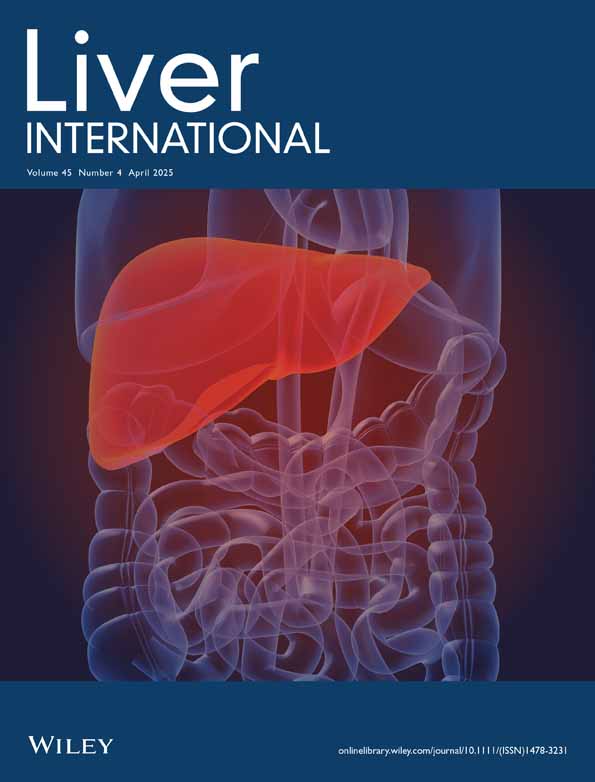Global Burden of Major Chronic Liver Diseases in 2021
Funding: This work was supported by the National Natural Science Foundation of China (grant numbers 82 070 588, 82 370 577), the National Key R&D Program of China (2023YFA1800801), the Science and Technology Project of Shaanxi Province (2023-YBSF-385), the Xi'an City Association for Science and Technology (grant number 959202413081), the Scientific Research Plan Project of the Shaanxi Provincial Department of Education (23JK0646) and the Xi'an Medical University 2024 Special plan for scientific and technological capacity improvement (2024NLTS096). JG is supported by the Robert W. Storr Bequest to the Sydney Medical Foundation, University of Sydney; National Health and Medical Research Council of Australia (NHMRC) (APP1053206, APP2032407, NCRI000183, APP2016215, APP2010795, APP1196492), and a Cancer Institute NSW grant (2021/ATRG2028).
ABSTRACT
Background
This study utilised the Global Burden of Disease data (2010–2021) to analyse the rates and trends in point prevalence, annual incidence and years lived with disability (YLDs) for major chronic liver diseases, such as hepatitis B, hepatitis C, metabolic dysfunction-associated liver disease, cirrhosis and other chronic liver diseases.
Methods
Age-standardised rates per 100,000 population for prevalence, annual incidence and YLDs were compared across regions and countries, as well as the socio-demographic index (SDI). Trends were expressed as percentage changes (PC) and estimates were reported with uncertainty intervals (UI).
Results
Globally, in 2021, the age-standardised rates per 100,000 population for the prevalence of hepatitis B, hepatitis C, MASLD and cirrhosis and other chronic liver diseases were 3583.6 (95%UI 3293.6–3887.7), 1717.8 (1385.5–2075.3), 15018.1 (13756.5–16361.4) and 20302.6 (18845.2–21791.9) respectively. From 2010 to 2021, the PC in age-standardised prevalence rates were−20.4% for hepatitis B, −5.1% for hepatitis C, +11.2% for MASLD and + 2.6% for cirrhosis and other chronic liver diseases. Over the same period, the PC in age-standardized incidence rates were -24.7%, -6.8%, +3.2%, and +3.0%, respectively. Generally, negative associations, but with fluctuations, were found between age-standardised prevalence rates for hepatitis B, hepatitis C, cirrhosis and other chronic liver diseases and the SDI at a global level. However, MASLD prevalence peaked at moderate SDI levels.
Conclusions
The global burden of chronic liver diseases remains substantial. Hepatitis B and C have decreased in prevalence and incidence in the last decade, while MASLD, cirrhosis and other chronic liver diseases have increased, necessitating targeted public health strategies and resource allocation.
Conflicts of Interest
C.D.B. has received grant support from Echosens. Y.Y. is a consultant to Zydus and Novo Nordisk. V.W.-S.W. reports grants from Gilead Sciences; consulting fees from AbbVie, Boehringer Ingelheim, Echosens, Gilead Sciences, Intercept, Inventiva, Novo Nordisk, Pfizer, TARGET PharmaSolutions; honoraria for lectures from Abbott, AbbVie, Gilead Sciences and Novo Nordisk, and he is Chairman of the Subspecialty Board of Gastroenterology and Hepatology, Hong Kong College of Physicians and Co-founder of Illuminatio Medical Technology Limited. W.-K.C. is a consultant or advisory board member for Abbott, Roche, AbbVie, Boehringer Ingelheim, and Novo Nordisk; and a speaker for Abbott, Novo Nordisk, Echosens, Viatris and Hisky Medical. W.-K.S. serves on advisory boards for Abbott and Gilead, received research funding from Alexion, Boehringer Ingelheim, Pfizer, Ribo Life Scienceand Gilead, and received honoraria from AstraZeneca, Abbottand Gilead. J.D.R. received consultancy fees from Falk, Gilead, Pfizer and a speaker honorarium from Takeda. L.V. reports consulting fees from Gilead, Pfizer, AstraZeneca, Novo Nordisk, Intercept pharmaceuticals, Diatech Pharmacogenetics, IONIS and Viatris; honoraria from MSD, Gilead, AlfaSigma, AbbVie, Resalis and grants from Gilead. J.M.S. serves as a consultant for Akero, Alentis Therapeutics, AstraZeneca, Apollo Endosurgery, Boehringer Ingelheim, GSK, Ipsen, Inventiva Pharma, Madrigal, MSD, Northsea Therapeutics, Novartis, Novo Nordisk, Pfizer, Roche, Sanofi and Siemens Healthineers. He has received research funding from Gilead Sciences, Boehringer Ingelheimand Siemens Healthcare GmbH. He holds stock options in AGED diagnostics and Hepta Bio. He has also received a speaker honorarium from Gilead Sciences, Advanz, Echosens and MedPublico GmbH. S.U.K. reported personal fees from Gilead Sciences, GSK, Bayer, Eisai, AbbVie, Echosens, MSD, Bristol-Myers Squibb, AstraZeneca, and grants from AbbVie, Bristol-Myers Squibb and Gilead Sciences. J.G. serves on Advisory Boards and receives honoraria for talks from Novo Nordisk, AstraZeneca, Roche, BMS, Pfizer, Cincera, Pharmaxis, Gilead, AbbVie and Boehringer Ingelheim. C.Q.P. received institutional research grants from Gilead Sciences and Wuxi Hisky Medical Technologies Co. Ltd. M.-H.Z. has received honoraria for lectures from AstraZeneca, Hisky Medical Technologies and Novo Nordisk, as well as consulting fees from Boehringer Ingelheim. No other disclosures were reported.
Open Research
Data Availability Statement
The data that support the findings of this study are available on request from the corresponding author. The data are not publicly available due to privacy or ethical restrictions.




